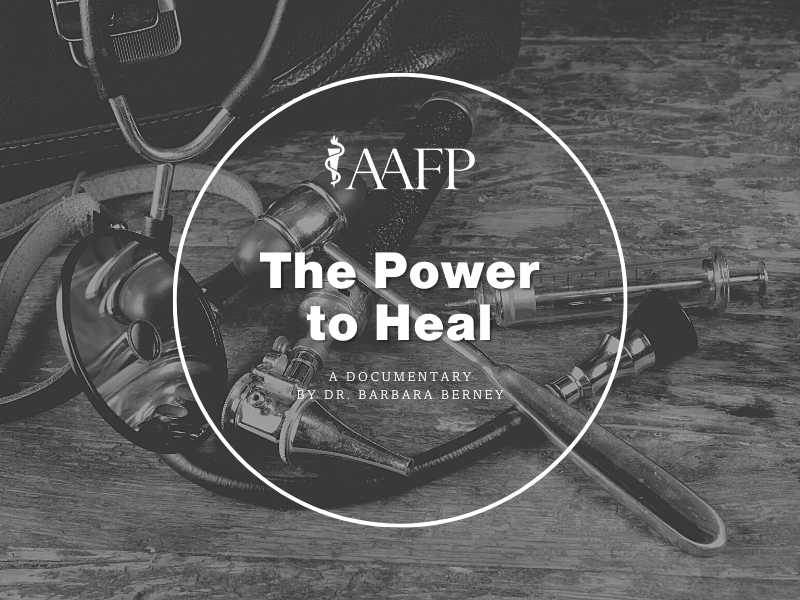Black History Month
AAFP Hosts Film, Town Hall Highlighting Equity, Advocacy
February 22, 2021, 1:24 pm News Staff — As part of the Academy’s ongoing recognition of Black History Month, AAFP members now have exclusive access to watch Power to Heal, an award-winning documentary that explains how Civil Rights activists, medical professionals and the federal government together leveraged Medicare funding to desegregate thousands of hospitals across the country, providing Black Americans and other minorities with equal and adequate access to physicians and other health-related services.

Because access to Power to Heal is limited to AAFP members through March 17, viewers must register in advance.
On March 10, the Academy will host a Virtual Town Hall with a panel of experts featuring Barbara Berney, Ph.D., M.P.H., the film’s producer and an associate professor at the City University of New York School of Public Health. All AAFP members are invited to participate.
About the Film
Power to Heal recounts, in part, the evolution of Medicare during the Civil Rights movement of the 1960s.
The film begins by reviewing the state of health care in the United States in the years following World War II, beginning with the passage of the Hill-Burton Act of 1946. At the time, nearly 40% of all counties in the United States did not have a single functioning hospital.
Story Highlights
The bill provided construction grants and guaranteed loans to communities that demonstrated they needed and could sustain a health care facility. By 1975, the Hill-Burton Act was thought to be responsible for the construction of more than 30% of all hospitals operating in the United States.
While the bill received bipartisan support in Congress, it also disproportionately negatively affected individuals and communities of color, as well as practicing Black physicians. For example, the law delegated the responsibility for assessing the health needs of rural areas to the individual states, which allowed the power structures in existence at the time to identify which communities would be considered as disadvantaged, and therefore which would receive assistance.
More specifically, the bill stated that discrimination on the basis of race, creed or color would be allowed provided there was “equitable provision on the basis of need for facilities and services of like quality for each such group,” making Hill-Burton one of the few pieces of legislation in the 20th century that explicitly allowed for the use of federal funds to provide racially exclusionary services. The U.S. Supreme Court overturned the provision allowing racial segregation in 1963 via Simkins v. Moses H. Cone Memorial Hospital, and the passage of the Civil Rights Act of 1964 formally eliminated the “separate but equal” provision from the legislation.
Narrated by actor Danny Glover, Power to Heal combines still photographs with archival film footage, newsreel clips and interviews with Civil Rights leaders, health professionals and historians. Since its debut, the film has claimed a number of awards, including a Board of Directors Award at the 2019 Pan African Film Festival and the award for best short film at the 2019 Ogeechee International History Film Festival.
AAFP members are encouraged to invite others to watch the film with them, especially those who are responsible for Medicare billing and payment. A trailer is available online.
About the Virtual Town Hall
The Virtual Town Hall on health equity will feature brief presentations and commentaries from Berney and three additional panelists:
- AAFP President Ada Stewart, M.D.;
- former AAFP President Warren Jones, M.D.; and
- Leon McDougle, M.D., M.P.H., president of the National Medical Association.
In addition to the presentations, the panel will feature an interactive question-and-answer session facilitated by Danielle Jones, M.P.H., director of the Academy’s Center for Diversity and Health Equity.
The Virtual Town Hall will be available for viewing on the Academy’s Facebook and Twitter pages and its YouTube channel.
Members may submit questions during the panel session, and a question-and-answer document will be posted online after the event.
The Virtual Town Hall has been approved for 1 AAFP Prescribed credit.
More Resources
The Power to Heal watch party and the Virtual Town Hall are among the Academy’s latest efforts in its ongoing advocacy of health equity. From its inception in 2017, the AAFP’s Center for Diversity and Health Equity has helped family physicians identify and address social determinants of health to improve patient and population outcomes.
A key component of the center is The EveryONE Project, which provides members with tools and resources to help advocate for health equity and promote workforce diversity. Among the most important is an implicit bias toolkit, published last year, that’s designed to increase clinician awareness of implicit bias and provide resources on how health care professionals can reduce its negative effects on patients.
Last month, the Academy debuted a new Health Equity webpage to raise awareness of the AAFP’s ongoing efforts. Among other resources, the site contains links to recent communications on health equity from the AAFP to the Biden and Trump administrations, joint communications efforts between the Academy and other healthcare organizations, and a health equity document archive that can be searched by general topics or specific issues.